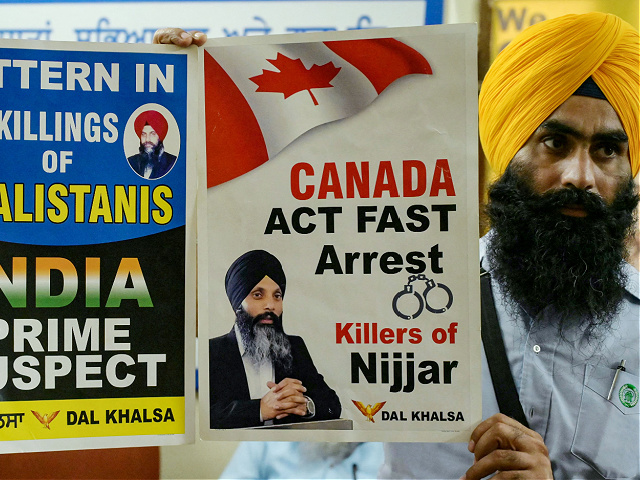Relations between Canada and India turned even more sour on Monday as each country expelled six of the other’s diplomats in a “tit-for-tat” exchange.
The diplomatic feud concerns the assassination of Sikh separatist leader Hardeep Singh Nijjar in June 2023.
Nijjar, who emigrated from India in 1997 and became a Canadian citizen in 2015, was gunned down in the parking lot of a Sikh temple near Vancouver. Four Indian nationals were arrested in May 2024 in connection with his murder.
Canadian Prime Minister Justin Trudeau publicly accused the Indian government of assassinating Nijjar on Canadian soil in September 2023. India rejected these allegations as “absurd.”
The allegations sparked a major diplomatic row between the two countries that persists to this day. Canada and India each expelled a senior diplomat shortly after Trudeau’s accusation.
On Monday, Canada’s Royal Canadian Mounted Police (RCMP) accused six Indian diplomats of being linked to Singh’s murder and to other serious criminal activity, including espionage.
“Investigations have revealed that Indian diplomats and consular officials based in Canada leveraged their official positions to engage in clandestine activities, such as collecting information for the government of India, either directly or through their proxies,” said RCMP Commissioner Mike Duheme.
“Evidence also shows that a wide variety of entities in Canada and abroad have been used by agents of the government of India to collect information. Some of these individuals and businesses were coerced and threatened into working for the government of India,” he added.
“The information collected for the government of India is then used to target members of the South Asian community,” Duheme said.
The RCMP said it presented evidence for its allegations to the Indian government and asked it to renounce diplomatic immunity for the accused officials. When India refused, Canada ordered the six to be expelled.
India responded by saying it would “recall” the highest-ranking of the accused diplomats, High Commissioner to Canada Sanjay Kumar Verma, along with other “targeted diplomats and officials.” India then expelled six Canadian diplomats in retaliation.
Canadian officials said the RCMP has identified Verma as a “person of interest” in Nijjar’s assassination.
“We will never tolerate the involvement of a foreign government threatening and killing Canadian citizens on Canadian soil. A deeply unacceptable violation of Canada’s sovereignty and of international law,” Trudeau said when he announced the expulsions.
“Canada fully respects the sovereignty and territorial integrity of India. We expect the Indian government to do the same for Canada,” Trudeau said.
“The Government of India strongly rejects these preposterous imputations and ascribes them to the political agenda of the Trudeau Government that is centered around vote bank politics,” the Indian Ministry of External Affairs responded.
“India reserves the right to take further steps in response to the Trudeau government’s support for extremism, violence and separatism against India,” the Indian statement said.
The ministry said Canada has not provided a “shred of evidence” for its allegations and accused Trudeau of following a “deliberate strategy of smearing India for political gains.”
Jagmeet Singh, leader of Canada’s left-wing New Democratic Party (NDP) and a Sikh himself, said Canada’s Sikh community has been “stalked by fear, threats, harassment and violence — including extortion, violence and electoral interference all allegedly at the hands of Indian officials.”
“In the interest of protecting Canadians and our country, I urge all leaders to get their security clearance and hold the Modi government accountable and refuse to look the other way,” Singh said.
Pierre Poilievre, leader of the opposition Conservative Party, agreed that the RCMP’s allegations were “extremely concerning and must be taken very seriously.”
“Any foreign interference from any country, including India, is unacceptable and must be stopped. Our government’s first job is to keep our citizens safe from foreign threats,” he said.
India’s opposition Congress Party on Tuesday urged Prime Minister Modi to hold a frank briefing for all of India’s parties on “the extremely sensitive and delicate issue of worsening India-Canada relations.”
Michael Kugelman of the Wilson Center, a think tank in the United States, told the BBC on Tuesday that the relationship between India and Canada “has been on a downward trajectory for several years, but it’s now hit rock bottom.”
“Publicly laying out extremely serious and detailed allegations, withdrawing ambassadors and top diplomats, releasing diplomatic statements with blistering language. This is uncharted territory, even for this troubled relationship,” Kugelman said.
Author and India-Canada expert Ryan Touhey predicted the diplomatic crisis could do some damage to Trudeau, “a prime minister who is seeming to go from one debacle to another.”
Touhey noted that the Indian diaspora in Canada was once dominated by Sikhs and Punjabis but now includes many Hindus and others from parts of India that are not terribly sympathetic to the Sikhs.
Those Canadian-Indian citizens tend to support the Modi administration, some of them very strongly, and they might be responsive to New Delhi’s accusations that Trudeau is merely playing “vote bank politics” by accusing the Indian government of murder.
“My strong sense is that after decades of pleading with Canadian governments to take Indian concerns over pro-Khalistani elements in Canada, they feel that they’re back to square one – except this time you have a much more different government in Delhi that is willing to act forcefully, right or wrong, to rein in perceived domestic threats,” Touhey said.
The BBC noted that Canadian police have warned at least a dozen members of Nijjar’s separatist Khalistan movement living in Canada that they faced “credible and imminent threats” from “criminal activity” orchestrated by agents of India.
